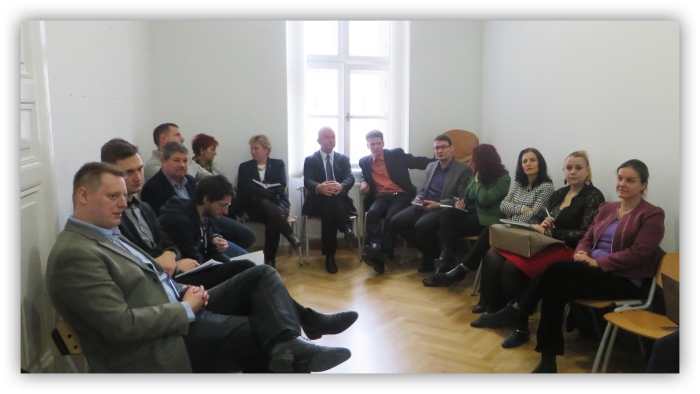Within the Legal Accessibility project, the first in our series of stakeholder workshops was held in Esztergom, at the St Adalbert Centre (10 Szent István square), home of the Ister-Granum EGTC and the CESCI European Institute for Cross-Border Studies. Stakeholders active in cross-border cooperation in the Slovak-Hungarian border region (especially from the centre region of the border area) were invited. In the form of a round table discussion, CESCI associates were collecting information on the legal obstacles, deficiencies and best practices experienced by local actors.
The meeting was held on the 27th of January 2016 and attended by 15 participants in the following sectors and fields:
- labour and employment policy: Esztergom District Offices’ Department for Employment, Komárom-Esztergom County Government Offices’ Head Department for Employment;
- education and training: Training Centre of Tatabánya;
- nature conservation: Danube-Ipoly National Park Directorate;
- government sector: Komárom-Esztergom County Government Offices, Szob District Offices;
- local government sector: Municipality of Ipolydamásd, City Council of Lábatlan, Pest County Council, City Council of Szob;
- European grouping for territorial cooperation: Ister-Granum European Grouping for Territorial Cooperation, Pons-Danubii European Grouping for Territorial Cooperation, Raba-Danube-Váh European Grouping for Territorial Cooperation.

In the field of labour and employment policy, administrative tasks such as calculating and converting years spent in employment, entitlement for subsidies and grants, as well as compulsory accreditation all pose frequent difficulties for cross-border commuters. A related problem is the fact that the standards of certain professions, as well as the interoperability of the two countries’ training systems are very limited. A further inconvenience is the mutual recognition of certificates, such as internships accomplished in the neighbouring country, or student cards. Validating student discount, especially on public transport can often be a significant problem. Cross-border commuting is also problematic from a public transport organisational point of view: apart from the fact that their offered schedule is not meeting the existing demand, transport lines crossing the border fall under different regulations as inland ones, which hinders operation and thus indirectly traveling itself.
The other field deemed problematic by most besides transport was health care. Primarily based on experiences in the Ister-Granum area, the discussed legal obstacles were on the one hand related to cross-border patient transport, and on the other hand to the emergency treatment of foreign citizens in Hungarian hospitals.
Last but not least some minor issues were mentioned concerning cross-border nature protection cooperation, as well problems related to the double public procurement obligations of cross-border projects.